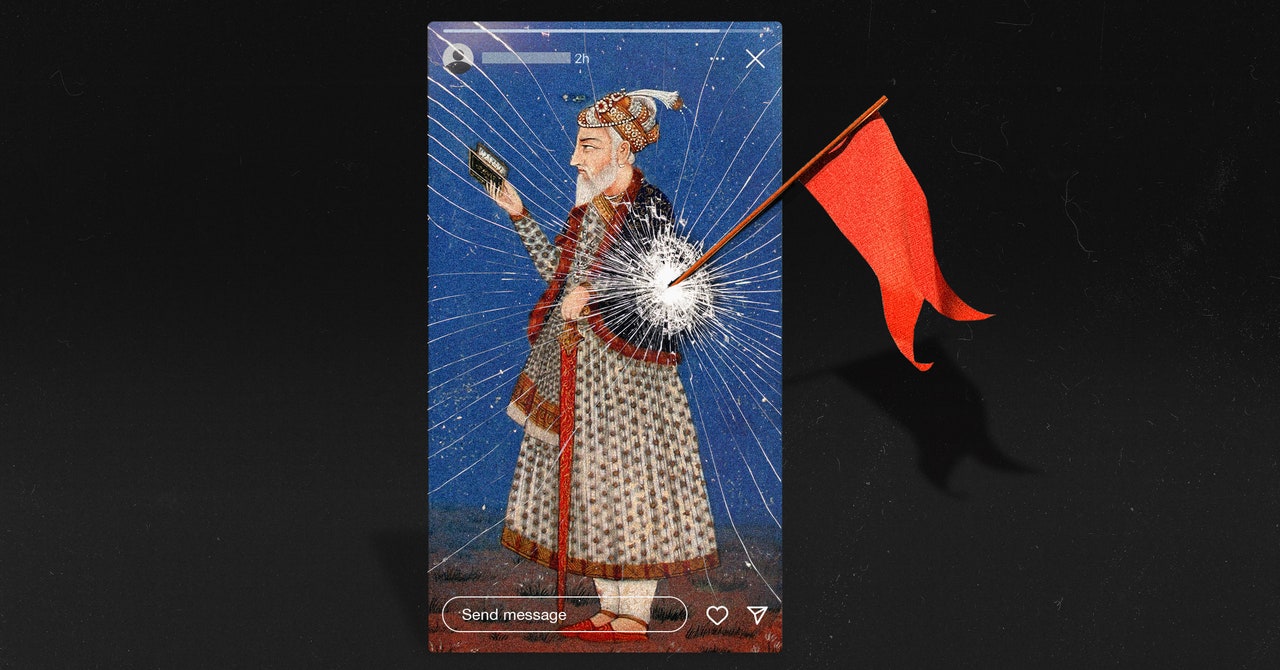Shafiq Bagwan was hanging out with some friends in his village of Hasnabad, western India’s Maharashtra state, when he opened Instagram on his phone and saw that his younger brother Taufiq had posted an update. When he clicked on it, his heart fell.
Taufiq, who is 18, had posted a picture of a 17th century Mughal emperor, Aurangzeb, describing him as “the father of Hindu nationalists”.
“I immediately called him up and ordered him to remove the story,” says Bagwan. “I got scared of him and I hoped no one had seen it.” It was too late. The following day, June 20, Taufiq was arrested and charged with “deliberate and malicious intent to outrage religious sentiment”.
Taufiq was engaged in an online crusade initiated by Hindu nationalists in Maharashtra, who have taken it upon themselves to monitor social media for anything, however feeble, that they may consider offensive to Hindus. These groups, which appear to have ties to local government and law enforcement, are turning Instagram and WhatsApp into hostile spaces for Muslims, who are harassed and arrested for seemingly innocent posts. It is yet another demonstration of how the Indian internet has come to reflect the Hindu nationalist slant of politics under Narendra Modi’s government.
“What happened offline has happened online,” said Osama Manzar, founder of the Digital Empowerment Foundation, an NGO. “The attitude remains the same. Social media is just another tool to subject.
Aurangzeb died more than 300 years ago, but he has recently become something of a protest symbol for Muslim youth in Maharashtra. During his reign, which lasted from 1648 to 1707, he expanded the Mughal Empire over much of the Indian subcontinent. To some Hindus, he is a tyrannical figure who imposed discriminatory taxes and destroyed temples and was opposed by Shivaji, another warrior king revered in Maharashtra.
With intercommunal tensions running high, Aurangzeb has become a symbol for both the Hindu majority and the 13 million Muslims, who make up about 12 percent of the state’s population.
“Aurangzeb, a Muslim ruler, is just a political tool to target today’s ordinary Muslims,” said Surendra Jondhale, a professor in the Department of Politics at the University of Mumbai. “The right-wing groups have used Shivaji versus Aurangzeb — a battle between two kingdoms — to propagate a binary between Hindus and Muslims.”
In February 2023, the union government, led by Modi’s Bharatiya Janata Party, renamed the city of Aurangabad in Maharashtra – named after Aurangzeb – to Sambhaji Nagar. In rallies that followed the renaming – and which were attended by members of the BJP – T Raja Singh, a party member and (currently suspended) lawmaker, said that any Muslim not satisfied with the name change would be considered a traitor.
The BJP has been widely accused of fomenting religious tensions across India and promoting a Hindu identity for India that violates the country’s tenets of religious pluralism.
In response to often brutal hate speech and discrimination by public figures, young Muslims have adopted Aurangzeb as a symbol of resistance. “It comes from a place of fear and humiliation, where the Muslims are constantly being provoked,” said Imtiaz Jaleel, a lawmaker from Aurangabad. “Under normal circumstances, Muslims don’t even think about Aurangzeb.”

